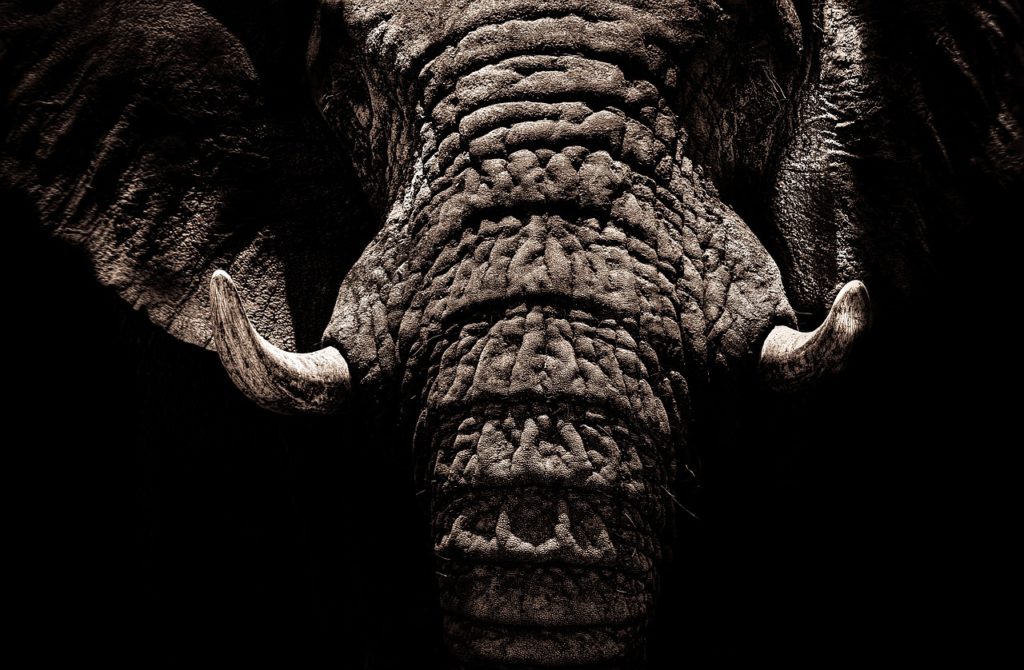Dear Friends of the Pub Quiz,
Elephants are easy to love. Our largest land mammals, these momentous tanks of seeming muscle and love have inflamed the imagination of zoogoers for decades, representing superstar animals that can sustain the attention needed for a struggling zoo. The elephants in such zoos struggle, living much shorter lives in captivity than in the wild, due usually to disease and muscular problems resulting from their captivity. At least we no longer use them for warfare, as Alexander the Great did when growing and controlling his demesne, or the Carthaginian general Hannibal when guiding elephants over the Alps in his attacks on the Roman Empire.
Elephants’ greatest threats are poaching, the ivory trade, and loss of habitat. As a National Geographic article from last year reveals, elephant counts across most relevant African countries (18 in all) reveal their number plummeting in recent years, and that “Africa now has 352,271 savanna elephants left in 93 percent of the species’ range.”
The article continues: “The census was funded by Microsoft founder Paul G. Allen and took just under three years to complete. Led by the nonprofit Elephants Without Borders, which is based in Botswana, the survey involved a team of 90 scientists, six NGOs, and two advisory partners: the Kenya-based conservation organization Save the Elephants and the African Elephant Specialist Group, made up of experts who focus on the conservation and management of African elephants.”
In the late 1970s and early 1980s, my dad and stepmom lived within walking distance of the National Zoo – on Sundays we woke to the sound of howler monkeys. My mom moved close to that same zoo in 1989. During both of those eras, I remember walking over to the Zoo to watch the elephants, huge lumbering creatures that seemed so playful and affectionate with each other. As I did before writing these words, today one can watch these beasts on an Elephant Cam; the six Asian elephants are named Ambika, Shanthi, Bozie, Kamala, Swarna and Maharani. From perches above the possible fray, volunteers follow the enormous beasts with cameras, just as student staff members of Academic Technology Services at UC Davis do when using remote cameras to lecture-capture faculty who sometimes move about as slowly as elephants.
As with that last sentence, usually elephants come up as metaphors or symbols, whether they be two-syllable named elephants such as Babar, Horton, or Dumbo, or the unnamed elephant that has stood as a symbol for the Republican party since 1874. My favorite Disney historian and youngest son Truman tells me that that the first U.S. president to visit Disneyland, Harry S. Truman, would not ride with his family in the Dumbo ride, for he didn’t want to be photographed inside a representation of the Republican party. Such partisanship!
Speaking of Republicans, last week I shared some unkind words about Trump’s party online when Trump’s U.S. Fish and Wildlife Service proclaimed that it would overturn the Obama administration decision disallow hunters from bringing ivory tusks and other elephant parts from Zimbabwe or other African countries into the United States. I saw this as yet another thoughtless act that would benefit (?) only a few wealthy hunters, as well as a great number of increasingly cruel poachers, some of whom have taken to hunting elephants with drones.
I called the White House the morning this decision was announced, but just waited endlessly on hold to offer my comment. Evidently others were calling, too to register their outrage. Today’s LA Times has an opinion piece by Carla Hall that commends Trump for finally stepping in. The headline reads: “Trump’s best decision so far: He doubles down on banning elephant trophies.” Some would see this decision as merely symbolic, and perhaps another distraction from more significant concerns, but at least now we can take heart that our government is not actively exacerbating a heartbreaking problem, and another generation of schoolchildren and conservationists can imagine hordes of elephants living and socializing unmolested in our world’s few remaining wild places.
Tonight’s Pub Quiz will feature questions about World War II, networks, subterfuge, losing pounds, Vincent Price and other actors, night vision, requested favors, world capitals, gold medals, succession, overwhelming offense, favorite vegetables, remnants of evil, British rockers, literary antagonists, the deal with protein, floating Welshmen, a break with a 300-year tradition, record numbers of escalators, unlikely flight, short titles, blurbs from Faulkner, misled Germans, religious programming, bargemen who wake the sleeping residents of riverside hamlets, the distance from Davis, the need for badges, small numbers of digits, civil rights, thousands of leagues, going back to school, and Shakespeare.
I hope to see you this evening. When I was a kid, we got two days off for Thanksgiving. Now schoolchildren seem to have the entire week to lollygag. We will find out tonight how this shift in school schedules will affect Pub Quiz participation, but I recommend coming early to claim a table. Either way, enjoy the holiday.
And if you are considering holiday gifts, I hope that my first Pub Quiz book will be published and for sale a month from today. Decide now who on your list deserves a copy!
Your Quizmaster
https://www.yourquizmaster.com
http://www.twitter.com/yourquizmaster
http://www.facebook.com/yourquizmaster
Here are three questions from last week’s quiz:
- Gun Statistics. Compared to the United States, only one country has a higher rate of mass shootings among countries with more than 10 million people, and it comes after the US in the alphabet. Name the country.
- Science. The chemical element with atomic number 19 is known in Latin as Kalium. By what English name to we know it?
- Shakespeare. In the play Hamlet we learn from Polonius that “brevity is the soul of WHAT”?
P.S. Poetry Night in Davis returns on December 7th with Bill Gainer and Anna Marie!




